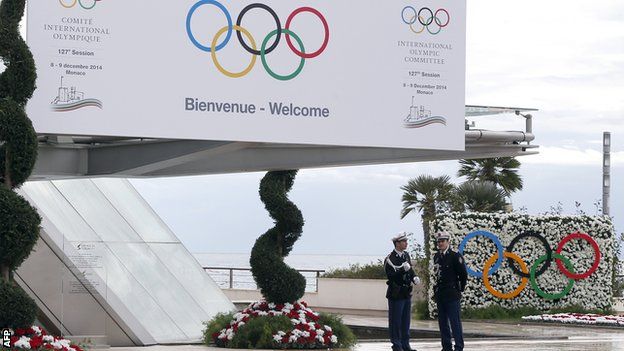Olympics: 28-sport cap dropped by the IOC at Monaco meeting
- Published

The first five recommendations of Olympic Agenda 2020 were unanimously passed
A 28-sport cap for future summer Olympics has been dropped as part of a 40-point action plan to revamp the sporting showpiece.
Potential hosts will also find it easier and cheaper to bid under the "Olympic Agenda 2020" reforms.
The changes were voted on by the International Olympic Committee during a two-day meeting in Monaco.
The IOC has also agreed to allow future Games to hold events outside the host country or city.
Potential hosts will also get extra financial support.
Instead of a 28-sport limit, each summer Games will be restricted to 10,500 athletes and 310 events.
No changes will be implemented for the 2016 Olympics in Rio de Janeiro but both baseball and softball could now be included in the 2020 Games in Tokyo given they are highly popular in Japan.
For that to happen, though, existing Olympic sports would need to reduce the number of events they stage.
"This is a major breakthrough," said Canadian IOC member Dick Pound. "We were at a dead-end situation with 28 sports."
Asked which events could make way for new sports, he replied: "Synchronised swimming... and maybe triple jump."
That drew a sharp response from Sebastian Coe, bidding to become the next president of the body that governs world athletics, the IAAF.
"Triple jump is a sacrosanct sport in track and field," said the Briton, who won double Olympic gold in the 1500m.
Squash, which has failed on numerous occasions to win a place in the Olympics, could also benefit from the changes.
However, World Squash Federation president Narayana Ramachandran urged caution, insisting: "We cannot get ahead of ourselves.
"We simply remain hopeful that the changes will take us forward onto the next stage of our dream being realised at the earliest opportunity."
The new bidding process, meanwhile, is aimed at making the system cheaper and more flexible to attract future candidates.
Bidding for the 2022 Winter Games saw four of six candidates drop out because of financial concerns.
However, there were some concerns expressed about holding Olympics in different cities or countries.
Denis Oswald, the Swiss IOC member who oversaw the preparations for London 2012, said: "I am worried that the unique character of the Games could be diminished."
IOC vice-president John Coates, who presented the changes to bidding rules, said holding events outside the host city or country would only be considered in "exceptional circumstances".
- Published1 October 2014
- Published4 December 2014
- Published2 December 2014
- Published18 November 2014
- Published10 September 2013